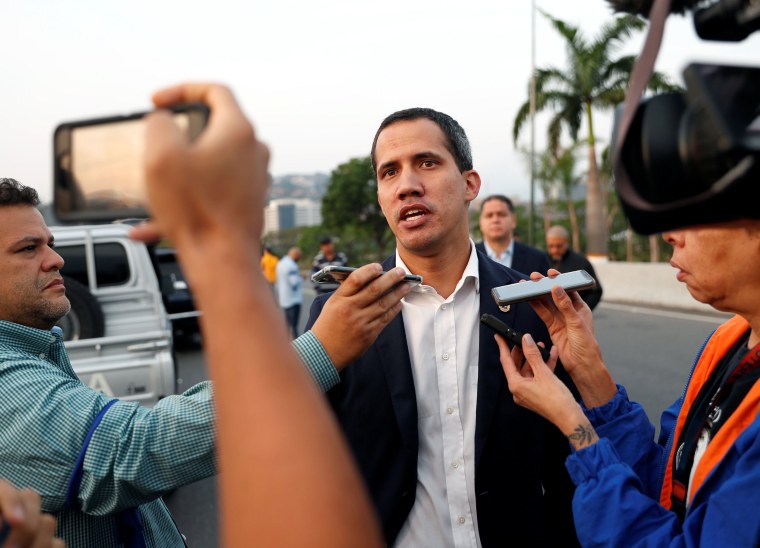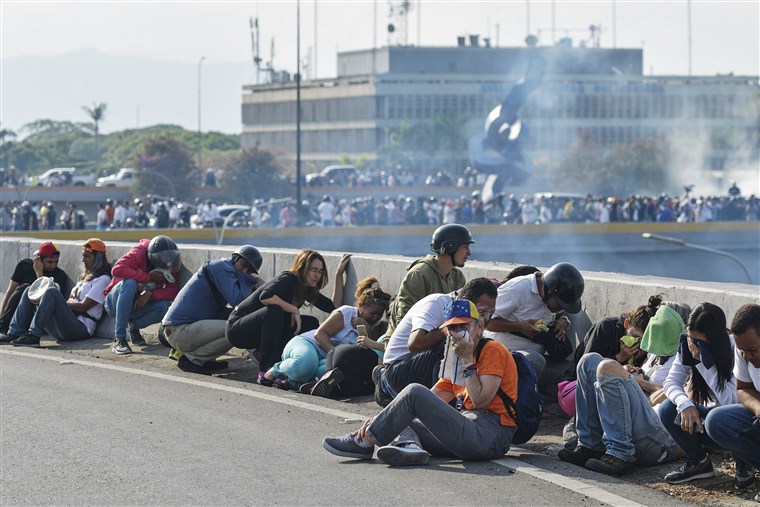By Daniella Silva and Isayen Herrera
CARACAS, Venezuela — Venezuelan opposition leader Juan Guaidó on Tuesday called for mass anti-government protests and military defections, announcing what he termed the “final phase” in an operation attempting to remove President Nicolás Maduro from office.
About an hour after Guaidó spoke, Maduro’s communications minister said the government was confronting a small group of military officers looking “to promote a coup” against the president.
“We call on the people to remain on high alert to, together with the glorious Bolivarian National Armed Forces, defeat the coup attempt and preserve the peace,” Jorge Rodriguez wrote on Twitter.
In a video posted on social media early Tuesday, Guaidó was flanked by a small group of soldiers outside the La Carlota military base in the Venezuelan capital city of Caracas.
“Today, brave soldiers, brave patriots, brave men attached to the constitution have followed our call,” said Guaidó, the head of the National Assembly, who has called himself the country’s interim president.
“Today, we are counting on the people of Venezuela,” he said. “Today, the armed forces are clearly on the side of the people, they are on the side of the constitution.”
Guaidó called on the military and the Venezuelan people to join him in nonviolent protest against Maduro. Though he spoke alongside a group of soldiers, it was not clear how much of the military’s support he had.
About 2,000 people took to the streets in the area of Altamira, near the military base, starting after 8 a.m. Tuesday morning. Access to Twitter had been limited that morning and Venezuelans shared the video of Guaidó on WhatsApp chains.
Some who found out about the demonstrations looked for buses to return home to take shelter.
In El Paraíso and La Candelaria, middle-class neighborhoods located west of Caracas, demonstrators blocked roads and were stopped by members of the National Guard still under the control of the Nicolás Maduro regime.
“It’s today or it is never,” said Jorge Alberto Gonzalez, 33, from El Paraiso while watching the main avenue to his house being blocked and set on fire to prevent the National Guard from entering the area. He said he was sure “more military will join” the opposition.
After 10 a.m., the protesters took to the Francisco Fajardo highway at the height of the base to face the guard that still supports Maduro. Eventually, some managed to break down gates and enter the area.
Later, Guaidó-led protesters marched to the west of the city, although they did not yet have a defined route.
Some of the clashes were violent, with tear gas and rubber bullets being used on protesters and local media showed video of what appeared to be a military vehicle running over demonstrators.
By Tuesday afternoon, 57 people had been injured by rubber bullets and one woman was shot with a firearm twice in the stomach, according to a Venezuelan health official.
The Venezuelan defense minister said a pro-government colonel had been shot in the neck, although his condition was unclear.
Hundreds of Maduro’s supporters gathered at a rally beside the presidential palace, where security forces were deployed on the perimeter wall, chanting slogans of support, the Associated Press reported. The palace was surrounded by members of the military.
Maduro wrote on Twitter that he had spoken to Venezuela’s military leaders and that they had shown “total loyalty” to the country and the constitution. He also called for “maximum popular mobilization” to assure victory.
Guaidó addressed a crowd of his supporters later Tuesday morning in Caracas, saying through a loudspeaker that “today we know that all Venezuelans, all, are in favor of change.”
Guaidó was also joined by detained activist Leopoldo López, who said he had been freed by members of the military.

In a post on Twitter, Guaidó said the “end of the usurpation” had been initiated.
“At this moment, I am with the main military units of our Armed Forces, beginning the final phase of Operation Freedom,” he wrote.
In the video posted Tuesday morning, Guaidó — who had been calling for a massive demonstration May 1 — said the plan had been moved up a day and that the operation “starts today.”
Rodriguez, Maduro’s communications minister, tweeted later that the country was “facing and deactivating a small group of traitor military personnel” promoting a coup.
Speaking on Venezuelan state television, Constituent Assembly Chief Diosdado Cabello said that a small group of sergeants and military intelligence officials had defected, and that Maduro was calling on supporters and the military to gather at Miraflores Palace to defend the government.
President Donald Trump said on Twitter Tuesday afternoon that he was monitoring the situation in Venezuela “very closely” and that the U.S. “stands with the People of Venezuela and their Freedom!”
National security adviser John Bolton said Trump wants to see “a peaceful transfer of power” from Maduro to Guaidó and that he believed that was still possible.
Bolton said it was still important for “key figures in the regime who have been talking to the opposition over these last three months to make good on their commitments to achieve the peaceful transfer of power” and went on to list specific officials within the regime.
“Figures like Defense Minister Vladimir Padrino, Chief Judge of the Venezuelan Supreme Court Maikel Moreno, the Commander of the Presidential Guard Rafael Hernandez Dala, all agreed that Maduro had to go,” he said. “They need to be able to act.”
Bolton went on to say that, “the Cubans, we believe, have played a very significant role in propping Maduro up today, possibly with help from the Russians, that’s the speculation certainly in Caracas.”
Earlier Tuesday, Vice President Mike Pence addressed Guaidó in support of the operation, saying on Twitter, “We are with you!”
“America will stand with you until freedom & democracy are restored,” he wrote.
Secretary of State Mike Pompeo also voiced support for the opposition, writing on Twitter that the “U.S. Government fully supports the Venezuelan people in their quest for freedom and democracy.”
Maduro won re-election for a six-year term last year in a widely disputed election that many countries, including the United States and most Western nations, did not recognize.
In late January, Guaidó invoked a constitutional provision to claim he was interim president, drawing the backing of many countries, but the military has remained largely in support of Maduro.
Isayen Herrera reported from Caracas, Venezuela, and Daniella Silva reported from New York.


























